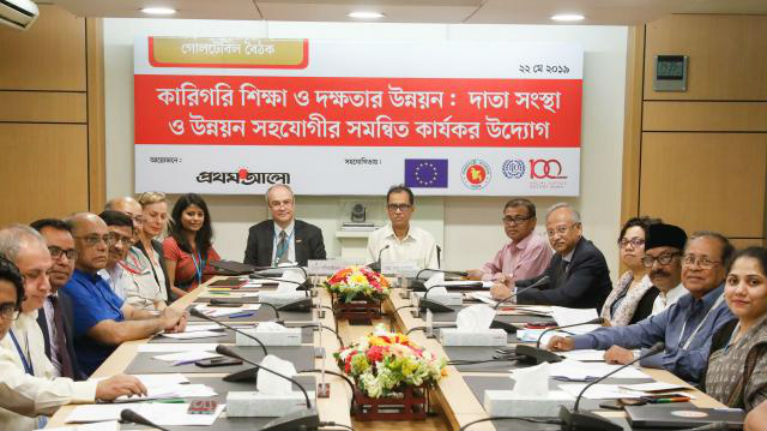Roundtable discussion on the Way to TVET Sector Wide Approach (SWAp): Challenges and Opportunities
ILO’s European Union funded project Skills 21 organized a roundtable discussion for effective skills governance with its constituents in collaboration with the Daily Prothom Alo on 22 May 2019.

Comprehensive efforts from government and donors for effective planning and its implementation is necessary for Technical and Vocational Education and Training (TVET) and skills development sector, speakers said at the round table discussion on Way to TVET SWAp: Challenges and Opprtunities organized jointly by ILO’s EU funded Skills 21 project and the Daily Prothom Alo.
To establish a Sector Wide Approach (SWAp) for good skills governance in the country is needed, but there are big challenges ahead before adopting the approach.
SWAp is a process in which funding for the sector -- whether from the public exchequer or donors -- supports a single policy and expenditure programme, under government leadership. Participants proposed a thorough analysis of demand of skilled labour in local and international market before adopting SWAp.
Discussants said better linking between education and training to current and emerging demands for jobs in country and abroad are important. All stakeholders will need to work together under the leadership of the government, who will need to set the priorities.
Technical and Madrasa Education Division Secretary Md Alamgir said 22 ministries work on the technical education and skill development process. Alamgir alleged that many donors do not respond to request for funding in technical education, adding that the government is working on reaching technical education to more people. “Government is planning to introduce a 100 marks course on skills development for all students of general stream from class VI,” he added.
Directorate of Technical Education director planning and development Jahangir Alam said the government has been successful in increasing enrolment in TVET. He, however said there is duplication in development projects carried out by the donors. “SWAp will be effective for a concerted effort and will help get rid of such duplications,” he added.
The government has to take the driving seat of SWAp in TVET sector, otherwise it might collapse, observed World Bank senior economist Syed Rashed Al-Zayed.
Bangladesh Employers’ Federation President Kamran T Rahman said there are gap of skills in the force labour in Bangladesh. “This skill gap will widen in the future as technology-led fourth industrial revolution is approaching,” he added.
“We need quality technical education based on market demand. For that, qualified teachers, well-equipped institutions and up-to-date curriculum are must,” Rahman said.
National Coordination Committee for Workers Education President Shah Md Abu Zafar said currently technical education is facing acute teacher crisis, lack of proper infrastructure and monitoring from government.
“I heard there is a need for governance and transparency in budgeting and necessity of result-based planning,” ILO Bangladesh country director Tuomo Poutiainen said. “There are some intense issues such as weak educational institutions, high degree of informality, and gender disparity in the labour market.”
Former line director of Primary Health Care at Directorate General of Health Services Zakir Hussain; Team Leader of Education and Human Development of EU Delegation Dorte Bosse; ILO specialist Manas Bhattacharya; Global Affairs Canada Senior Development Advisor Riful Jannat; and Asian Development Bank Social Sector Specialist Zhigang Li spoke at the roundtable, moderated by Prothom Alo Associate Editor Abdul Quayum.
| Recommendations |
|---|
| •There should be strong leadership from the government to carry forward the sector wide approach agenda of technical education and skills development; •The upcoming five-year plan should place more emphasis on technical education; •We need to enhance the skills of teachers in technical institutions; •The curriculum in technical education institutes should be reformed keeping in mind the Fourth Industrial Revolution; •We have to ensure that students at the higher education level are equipped with adequate skills; •Private sector should come forward to play its role in technical education and skills development; •We need proper analysis of the labour market; •There should be more than one board for technical education; •Acceptability of skills certification beyond Bangladesh should be brought in through mutual agreement; •Steps should be taken to ensure availability of technical education for dropouts. |